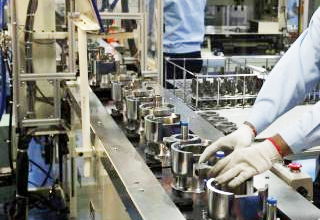“The Golden Age for Family Managed Businesses is Now”
Updated: Apr 18, 2016

A couple of my students of Family Managed Business once came and told me they wanted to go into the business of stationery. I was aghast: with all these years of management studies, research, and exposure to global business, you want to go into the business of stationery? What will you do, manufacture paper clips? Have a chain of photocopier shops? Sell printing paper from office to office? I tried my best to dissuade them, but they were certain that this is what they wanted to do. I threw up my hands. Here I was thinking we had prepared them for Fortune 500 companies, and they wanted to compete against people who own 10ft by 10ft shops and sell erasers and pencils, one or two at a time, to neighbourhood children!
They were adamant, however, and I did not hear from them for almost two years. One day they came and met me again, and requested me to address a meeting of their staff. Why would I want to address a bunch of stationery shop employees, I wondered. So, trying to be diplomatic, I asked, what level are they? They are all managers, came the reply. Managers? How many? 40 was the reply. In the business of stationary, I could not imagine what it was that they could possibly be doing that required the services of 40 managers! Well, I let that be and inquired as to the topic of my address. It was a strategic review meeting, I was told. Now, I was stumped. Not only had they built up a large-scale business in the rather small-scale world of stationery, but in only two years things had moved so fast that they were already thinking of reviewing their strategy!
In fact it is not surprising. As it stands today, we are into the golden period for family business and they need no longer think in terms of just the neighborhood, the town or even the country. Nor do they need to aim for a single digit growth and be delighted if the growth is 15 to 20%. Barbed wire fence, check posts and border guards may be there at the borders of countries, but in the world of business, there are no barriers, only opportunities that has made exponential growth a reality.
We are witnessing a shift in the paradigm and at Asian Institute of Family Managed Business (AIFMB), we have a five point proposition that deals with this new paradigm:
1. There is an explosion of opportunity, globally.
2. Only Indian Companies can take advantage of this.
3. Within Indian companies, it is the family managed businesses that are best placed.
4. Most Indian family managed businesses will fail to take advantage.
5. They can do so only if they learn the rules of the new paradigm and adapt.
Let us expand a bit on this five point proposition:
1. All over the world, there is an explosion of opportunity
It was way back in 2003 when Tomas Friedman in his famous book ‘The World is Flat,’ highlighted ten major changes that have shaken the world. Till then, the world was uneven - those who were at top generally remained at the top, and the bottoms rungs of society were also condemned to languish there forever. But with these ten major changes, the world became flat, opening floodgates of opportunities to anyone willing to take advantage.
These changes can be broadly categorized in three major groups; globalization, IT and new models of business.
Since the collapse of Berlin wall, globalization has accelerated, and now the world is virtually one. During a session in Pakistan some local businessmen complained to me that the law and order situation in their country is not good and is very difficult to do business. Others from the class immediately retorted, ‘what stops you from buying from China and selling in Brazil?’ In other words, you are no longer limited by physical boundaries to be able to do business.
The world wants goods and services, and the technology and channels that can facilitate the delivery of those goods and services from one corner of the world to the other exist now. All it needs is for businesses with the knowledge and will to exploit them.
Communication, which used to take weeks to be conducted between cities, now takes seconds, even it is across continents. ‘Snail mail’ have been replaced with instantaneous email, real-time chats and video conferencing. Travel as well as transportation of goods has become faster.
You may have heard of the term Think Global and Act Local. It no longer applies. Today, you can Be Local and Act Global. You no longer need branch offices in 15 different foreign countries to be a global player. From your same old office in any city or town in India, you can reach customers in any market anywhere in the world.
2. Only Indian Companies can take the advantage of this Explosion of Opportunities
Why do we say this? There are a number of factors:
A. Business spirit in the genes: India has a very old civilization, and for most of history, the population has been divided on the basis of specialisation of the work that they do. Now, one may argue about the evils of the caste system, but one thing which it has done is create a whole class of people who are just ‘born’ to do business. When we speak of the Marwari or Sindi communities, or many other such communities across the country, it is unquestionable that children born to them have business in their DNA. Even in a remote village, when an illiterate old lady opens a chai stall, she instinctively knows how to price her product, what her customers will like, at what time to open the stall and when to shut it. And if you visit the stall after a month or two, you will see her selling buns and biscuits to go along with the chai. In a few years the stall will become a shop, and then a small restaurant. All this, without any degree or even basic education! This is what makes us born entrepreneurs, having business-savvy encoded in our genes.
B. Technical Bent of Mind: It seems Indian brains are wired differently. While we certainly lack an ability to innovate and invent, grasping technical concepts and the ability to work within set parameters seems to come easily to us. This is why technologically-intensive powerhouses like NASA, Google, Intel and Microsoft are full of Indians. We are mindful of our shortcomings, but we should not ignore our strong points either. Even among not so literate people, technical grasp is excellent, ergo the Indian reputation for jugaad. Little surprise then, that it is only in India that a cottage industry has sprung up that can repair the most advanced smartphones in little roadside shops.
Germany and Japan are generally known for their world leadership in technology. But when it came to IT, both had to accept the capabilities of the Indian mind. The Japanese Prime Minister, during a visit to India visited Bangalore to meet Narayan Murthy and invited him to set up office in Japan. A German Professor told me that when it comes to the average student, the Germans take time to grasp a technical concept, while Indians seem to do it very fast. They are deliberating if there is anything wrong with their system of education.
C. Quality: Though generally there is a negative opinion about Indian standards of quality, it is well within our ability to make world-class quality products. Bharat Forge supplies automotive components to some of the topmost and demanding car manufacturers in the world, and is doing so well it is the second largest supplier globally. Certainly, the cheap products are there too, like for example you can get Kaju Halwa at Rs. 90 a kilo or at Rs. 900 a kilo, depending on the quality you want. For people willing to pay, the best quality is available. This is borne out by the fact that The Demming award, which is the most coveted and renowned award for quality in the world, has been won by Indian companies seven out of ten times since 2002.
D. Costs: Indians have a well-earned reputation for being cost-conscious - we just can’t burn money, even if it is someone else’s! Perhaps due to the years of shortages, the numerous famines that have been a part of Indian history, or socio-religious contexts, the concept of reduce, reuse and recycle in nothing new in India.
E. A huge, open market: Recently, India overtook Japan as the third largest economy. The only countries with bigger markets are the USA and China. While the American market is saturated, in China the communist regime means that the market is closed and full of regulations and controls. India, however, has none of these disadvantages. Not only is there a huge scope for foreign players to come in, but also for Indian businesses to go global. Technology has made the market more democratic. While earlier if someone in India wanted the latest gadget or car, he had to go abroad to get it or import it at great expense, but today India gets access to everything at the same time as the rest of the world. At the same time, global markets have opened up for Indian companies.
F. A large pool of talent: There are more educated, young people who are English-speaking and IT-savvy in India than in any other country in the world. What this means is that while countries like the USA have to look abroad to fill up positions in IT, in medicine and research, in India we have all the manpower we need right here.
G. Low labor costs: Indian labor costs are among the lowest in the world, even lower than those of China.
H. And finally, it’s Sixty rupees to a Dollar: A favourable exchange rate is an advantage that makes Indian companies competitive all over the world.
No other country in the world offers this mix of advantages, and further liberalisation of laws and improvement of infrastructure can make things even better.
3. Within Indian Businesses it is the family managed businesses who are best placed to grab these opportunities
In a fast changing business world, if opportunities can come from anywhere, so can cut-throat competition. Decisions have to be taken on the fly, as it were, and long-term plans made on the spur of a moment. This kind of flexibility is simply not possible in a large corporate environment. What Sunil Mittal did in moving from bicycle parts to Telecom in a short span of time, a large conglomerate like Unilever just cannot do. What DLF did in becoming a real estate giant almost overnight, L&T can never do, certainly not in that span of time.
A large board of directors with differing views can lead to a virtual stalemate which can last for months if not years. Vice-presidents of different divisions pull in different directions, sometimes to the detriment of the company as a whole. And this is without even mentioning the shareholders who often want short term dividends at the expense of long-term viability. This kind of business model may well have been okay in the ‘mechanical’ age, but in today’s times, by the time you have got all the stakeholders into the boardroom for a meeting to discuss the opportunity, the opportunity itself will already have passed. But in a family business, where you have one or at the most two or three primary decision makers, fast decision-making is possible. But are Indian family businesses ready for this?
4. Most Indian Businesses Will Fail to Grab These Opportunities
Like I mentioned before, Indian Family Businesses have to be ready. Readiness implies not only the willingness to take quick decisions, but having the knowledge and ability to recognize a good opportunity, and being well-prepared to take advantage of it. And let us face it, most Indian Family Businesses are stuck in a time warp, just like the corporates. They are basking in the past glory and content with comparing how far they have come today, with what they were when they started. What they fail to see is that some others who started with them have now become business giants in their own right. The attitude is that they already know all there is to know, and there is nothing more left to learn.
5. Indian Family Businesses Need to Learn and Adapt
The family businesses that survive, and thrive, will be the ones who can see that the times are changing, and can adapt themselves to change. For this, they have to be willing to learn new things, be open to new ideas, and be willing to let go of the old way of doing things. Only those that do this will succeed.
The question arises, when we had all these advantages, why did we not make progress earlier? Being left behind in the industrial revolution, foreign rule, and being cut off from the world because of social barriers have been factors that held us back. Now, we have opened up to the world, and the world has opened up to us. There are no barriers anymore. There is nothing to hold us back, except ourselves. The world of opportunity awaits.
Blog By Prof Parimal Merchant, Advisor -Asian Institute of Family Managed Business (AIFMB)







 Loading...
Loading...





COMMENTS
Be first to give your comments.